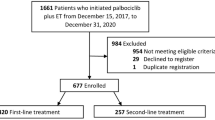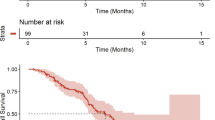Abstract
Background
Addition of carboplatin (C) to trastuzumab (T) and paclitaxel (P) improves the efficacy in HER2+ metastatic breast cancer (MBC). The aim of this phase-II study was to evaluate the efficacy and safety of this combination given weekly (3×) followed by a week off. The primary endpoint was: objective response rate (ORR), and secondary endpoints were: time to progression (TTP), overall survival (OS), and toxicity profile.
Methods
HER2+ MBC patients were included in the study. Treatment was as follows: T (loading dose:4 mg/kg per week and 2 mg/kg per day thereafter), P (80 mg/m2) and C (AUC 2) given weekly 3×, followed by 1 week off until disease progression or unacceptable toxicity.
Results
Forty-one patients (pts) were enrolled—median age: 54.5 years (range 29–75); 87.8% PS 0 or 1; 39 (97.5%) had received prior adjuvant or neoadjuvant treatment; 11 (27%) had received one prior CT line for metastatic disease; disease sites: liver (40%), bone (32.5%), lymph nodes (32.5%) and lung (20%); 19 (47.5%) had ≥2 lesions and 97.5% had measurable disease. A total of 37 pts were evaluated for response: 11(26.8%) CR; 12 (29.3%) PR; 9 (22%) SD; 5 (12.2%) PD and 4 NE, resulting in an ORR of 56.1% (95% CI 39.7–71.5%) and tumor growth control rate (RR + SD) of 78% (95% CI 62.4–89.4%). With a median follow up of 39.4 months, 26 (70.3%) patients have progressed. The median time to progression was 12.3 months (95% CI 8.2–15.5). At the time of this report, ten patients have died. Forty patients received 202 cycles (median five cycles). Grades 3–4 toxicities/pts: 3 (7.5%) anemia, 2 (5%) leucopenia, 10 (25%) neutropenia, 1 (2.5%) febrile neutropenia,1 (2.5%) thrombopenia, 2 (5%) asthenia, 2 (5%) diarrhea, 3 (7.5%) nausea, 2 (5%) vomiting, and 3 (7.5%) mucositis.
Conclusions
The schedule showed an interesting activity, taking into account that 27% of patients had received previous treatment for MBC. One week of rest may benefit not only the patient but may also improve tolerability and efficacy of the combination.
Similar content being viewed by others
References
Greenlee RT, Murray T, Bolden S, Wingo PA (2000) Cancer statistics. CA Cancer J Clin 50:7
Clark GM, Sledge GW Jr, Osborne CK, McGuire WL (1987) Survival from first recurrence: relative importance of prognostic factors in 1,015 breast cancer patients. J Clin Oncol 5:55–61
Henderson IC (1991) Chemotherapy for metastatic disease. In: Harris JR, Hellman S, Henderson IC, Kinne DW (eds) Breast diseases, 2nd edn. JB Lippincott, Philadelphia
Sledge GW Jr, Loehrer PJ Sr, Roth BJ, Einhorn LH (1988) Cisplatin as first-line therapy for metastatic breast cancer. J Clin Oncol 6:1811–1814
Sledge GW Jr, Roth BJ (1989) Cisplatin in the management of breast cancer. Semin Oncol 16:110–115
Martin M, Diaz-Rubio E, Casado A et al (1992) Carboplatin: an active drug in metastatic breast cancer. J Clin Oncol 10:433–437
O’Brien ME, Talbot DC, Smith IE (1993) Carboplatin in the treatment of advanced breast cancer: a phase II study using a pharmacokinetically guided dose schedule. J Clin Oncol 11:2112–2117
Hortobagyi GN (1993) Mitomycin: its evolving role in the treatment of breast cancer. Oncology 50:1–8 (review)
Canellos GP, Pocock SJ, Taylor SG et al (1976) Combination chemotherapy for metastatic breast carcinoma. Prospective comparison of multiple drug therapy with l-phenylalanine mustard. Cancer 38:1882–1886
Chlebowski RT, Irwin LE, Pugh RP et al (1979) Survival of patients with metastatic breast cancer treated with either combination or sequential chemotherapy. Cancer Res 39:4503–4506
Hoogstraten B, George SL, Samal B, et al (1976) Combination chemotherapy and adriamycin in patients with advanced breast cancer. A Southwest Oncology Group study. Cancer 38:13–20
Bull JM, Tormey DC, Li SH et al (1978) A randomized comparative trial of Adriamycin versus methotrexate in combination drug therapy. Cancer 41:1649–1657
A’Hern RP, Smith IE, Ebbs SR (1993) Chemotherapy and survival in advanced breast cancer: the inclusion of doxorubicin in Cooper type regimens. Br J Cancer 67:801–805
Aisner J, Weinberg V, Perloff M et al (1987) Chemotherapy versus chemoimmunotherapy (CAF v CAFVP v CMF each +/− MER) for metastatic carcinoma of the breast: a CALGB study. Cancer and Leukemia Group B. J Clin Oncol 5:1523–1533
Bishop JF, Dewar J, Toner GC et al (1999) Taxol Investigational Trials Group ANZ. Initial paclitaxel improves outcome compared with CMFP combination chemotherapy as front-line therapy in untreated metastatic breast cancer. J Clin Oncol 17:2355–2365
Chang AY, Boros L, Asbury R, Hui L, Rubins J (1997) Dose-escalation study of weekly 1-hour paclitaxel administration in patients with refractory cancer. Semin Oncol 24:S17–S71
Loffler TM (1998) Is there a place for “dose-dense” weekly schedules of the taxoids? Semin Oncol 25:32–34
Seidman AD, Hudis CA, Albanel J et al (1998) Dose-dense therapy with weekly 1-hour paclitaxel infusions in the treatment of metastatic breast cancer. J Clin Oncol 16:3353–3361 (review)
Munzone E, Capri G, Fulfaro F et al (1994) Paclitaxel by 3 h schedule in relapsed breast cancer resistant to anthracyclines. Ann Oncol 5:42 (abstract)
Pivot X, Asmar L, Hortobagyi GN (1999) The efficacy of chemotherapy with docetaxel and paclitaxel in anthracycline-resistant breast cancer. Int J Oncol 15:381–386
Hortobagyi GN (1997) Paclitaxel-based combination chemotherapy for breast cancer. Oncology (Huntingt) 11:29–37 (review)
Miller KD, Sledge GW Jr (1999) Taxanes in the treatment of breast cancer: a prodigy comes of age. Cancer Invest 17:121–136
Pouillart P, Fumoleau P, Romieu G (1999) Final results of a phase II randomized, parallel study of doxorubicin/cyclophosphamide and doxorubicin/Taxol (paclitaxel) as neoadjuvant treatment of local-regional breast cancer. Proc Am Soc Clin Oncol 18:73a (abstract)
Cassier PA, Chabaud S, Trillet-Lenoir V et al (2007) A phase-III trial of doxorubicin and docetaxel versus doxorubicin and paclitaxel in metastatic breast cancer: results of the ERASME 3 study. Breast Cancer Res Treat [Epub ahead of print]
Frasci G, Comella P, D’Aiuto G et al (1998) Weekly paclitaxel–cisplatin administration with G-CSF support in advanced breast cancer. A phase II study. Breast Cancer Res Treat 49:13–26
Gelmon KA, O’Reilly SE, Tolcher AW et al (1996) Phase I/II trial of biweekly paclitaxel and cisplatin in the treatment of metastatic breast cancer. J Clin Oncol 14:1185–1191
Sparano JA, Neuberg D, Glick JH et al (1997) Phase II trial of biweekly paclitaxel and cisplatin in advanced breast carcinoma: an Eastern Cooperative Oncology Group study. J Clin Oncol 15:1880–1884
McCaskill-Stevens WJ, Fox S, Harlan J, Sledge GW (1997) Phase I/II study of biweekly paclitaxel (P) and carboplatin (C) in the treatment of patients (pts) with stage IV breast carcinoma. Proc Am Soc Clin Oncol 16:A639 (meeting abstract)
Perez EA, Hartmann LC (1996) Paclitaxel and carboplatin for advanced breast cancer. Semin Oncol 23:41–45
Klaassen U, Wilke H, Harstrick A, Seeber S (1998) Fluorouracil-based combinations in the treatment of metastatic breast cancer. Oncology (Williston Park) 12:31–35
Nicholson B, Paul D, Shyr Y et al (1997) Paclitaxel/5–fluorouracil/leucovorin in metastatic breast cancer: a Vanderbilt Cancer Center phase II trial. Semin Oncol 24:S11–S23
Cocconi G, Mambrini A, Vasini G et al (1998) Vinorelbine combined with paclitaxel, administered in a continuous 96-hour IV infusion, in pretreated advanced breast cancer patients. Proc Am Soc Clin Oncol 17:208 (abstract)
Michelotti A, Gennari A, Salvadori B et al (1996) Paclitaxel in combination with vinorelbine in pretreated advanced breast cancer patients. Semin Oncol 23:38–40
Slamon DJ, Godolphin W, Jones LA et al (1989) Studies of the HER-2/neu proto-oncogene in human breast and ovarian cancer. Science 244:707–712
Slamon DJ, Clark GM, Wong SG et al (1987) Human breast cancer: correlation of relapse and survival with amplification of the HER-2/neu oncogene. Science 235:177–182
Seshadri R, Firgaira FA, Horsfall DJ et al (1993) Clinical significance of HER-2/neu oncogene amplification in primary breast cancer. The South Australian Breast Cancer Study Group. J Clin Oncol 11:1936–1942
Press MF, Bernstein L, Thomas PA et al (1997) HER-2/neu gene amplification characterized by fluorescence in situ hybridization: poor prognosis in node-negative breast carcinomas. J Clin Oncol 15:2894–2904
Ellis MJ, Coop A, Singh B et al (2001) Letrozole is more effective neoadjuvant endocrine therapy than tamoxifen for ErbB-1- and/or ErbB-2-positive, estrogen receptor-positive primary breast cancer: evidence from a phase III randomized trial. J Clin Oncol 19:3808–3816
Piccart MJ, Di Leo A, Hamilton A (2000) HER2: a ‘predictive factor’ ready to use in the daily management of breast cancer patients? Eur J Cancer 36:1755–1761
Pegram MD, Konecny GE, O’Callaghan C et al (2004) Rational combinations of trastuzumab with chemotherapeutic drugs used in the treatment of breast cancer. J Natl Cancer Inst 96:739–749
Vogel C, Cobleigh MA, Tripathy D et al (2002) Efficacy and safety of trastuzumab as single agent first-line treatment of HER2-overexpressing metastatic breast cancer. J Clin Oncol 3:719–726
Slamon DJ, Leyland-Jones B, Shak S et al (2001) Use of chemotherapy plus a monoclonal antibody against HER2 for metastatic breast cancer that overexpresses HER2. N Engl J Med 344:783–792
Pegram MD, Lipton A, Hayes DF et al (1998) Phase II study of receptor-enhanced chemosensitivity using recombinant humanized anti-p185HER2/neu monoclonal antibody plus cisplatin in patients with HER2/neu-overexpresing metastatic breast cancer refractory to chemotherapy treatment. J Clin Oncol 16:2659–2671
Fountzilas G, Tsavdaridis D, Kalogera-Fountzila A (2002) Weekly paclitaxel as first line treatment and trastuzumab in patients with advanced breast cancer. Ann Oncol 11:50–57
Nabholtz JM, Crown J, Yonemoto L et al (2000) Results of two open label multicentre pilot phase II trials with herceptin in combination with docetaxel and platinum salts (cis- or carboplatin) as therapy for advanced breast cancer in women overexpressing HER2. Breast Cancer Res Treat 64(1):82
Yardley DA, Greco FA, Hainsworth JD et al (2002) Final results of the pearl cancer research network first line trial of weekly paclitaxel/carboplatin/trastuzumab in metastatic breast cancer. In: 25th Annual San Antonio breast cancer symposium
Robert N, Leyland-Jones B, Asmar L et al (2006) Randomized phase III study of trastuzumab, paclitaxel, and carboplatin compared with trastuzumab and paclitaxel in women with HER-2-overexpressing metastatic breast cancer. J Clin Oncol 24(18):2786–2792
Washington CB, Lieberman G, Liu P et al (2002) A population pharmacokinetic model for trastuzumab following weekly dosing. Clin Pharmacol Ther 71:12
Charoin JE, Jacqmin P, Banken L et al (2004) Population pharmacokinetic analysis of trastuzumab following long-term administration using different regimens. Population Approach Group (PAGE), Uppsala. http://www.page-meeting.org
Baselga J, Carbonell X, Castaneda-Soto NJ et al (2005) Phase II study of efficacy, safety, and pharmacokinetics of trastuzumab monotherapy administered on a 3-weekly schedule. J Clin Oncol 23:2162–2171
Leyland-Jones B, Gelmon K, Ayoub JP et al (2003) Pharmacokinetics, safety, and efficacy of trastuzumab administered every three weeks in combination with paclitaxel. J Clin Oncol 21:3965–3971
Geyer CE, Foster J, Lindquist D et al (2006) Lapatinib plus capecitabine for HER2-positive advanced breast cancer. N Engl J Med 355:2733–2743
Pietras RJ, Fendly BM, Chazin VR, Pegram MD, Howell SB, Slamon DJ (1994) Antibody to her2/neu receptor blocks DNA repair after cisplatin in human breast and ovarian cancer cells. Oncogene 9:1829–1838
Pegram M, Forbes J, Pienkowski T et al (2007) BCIRG 007: first overall survival analysis of randomized phase III trial of trastuzumab plus docetaxel with or without carboplatin as first line therapy in HER2 amplified metastatic breast cancer (MBC). J Clin Oncol, 2007 ASCO annual meeting proceedings part I, vol 25, no. 18S (June 20 Supplement): LBA1008
Perez EA, Suman VJ, Rowland KM et al (2005) Two concurrent phase II trials of paclitaxel/carboplatin/trastuzumab (weekly or every-3-week schedule) as first-line therapy in women with HER2-overexpressing metastatic breast cancer: NCCTG study 983252. Clin Breast Cancer 6(5):425–432
Author information
Authors and Affiliations
Corresponding author
Rights and permissions
About this article
Cite this article
Ruiz, M., Salvador, J., Bayo, J. et al. Phase-II study of weekly schedule of trastuzumab, paclitaxel, and carboplatin followed by a week off every 28 days for HER2+ metastatic breast cancer. Cancer Chemother Pharmacol 62, 1085–1090 (2008). https://doi.org/10.1007/s00280-008-0709-7
Received:
Accepted:
Published:
Issue Date:
DOI: https://doi.org/10.1007/s00280-008-0709-7




